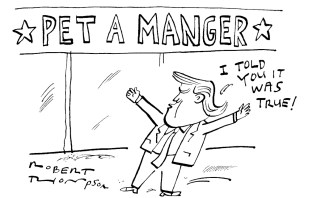The Conservative party is out of power – and that’s not easy if you’ve been in power for more than a decade. Even after a short spell in government there are certain aspects of life that you miss. The drivers and others who used to manage your life and get you around. The legions of advisers. The security detail (if you held one of the high offices of state). And the civil servants who do your bidding.
That last one is a joke, of course. I know most readers will, like me, have found it difficult to listen to Conservative ministers complaining about civil servants during their 14 years in power. There might well have been cause to moan that civil servants were all a bunch of lazy lefties for the first couple of years. But after four election victories – or three and a half depending on how you count them – complaints that the bureaucrats are thwarting your wishes come to seem like an excuse. Surely 14 years is time enough to hire new bureaucrats?
Whoever wins the leadership race will discover they have two things they can wield: words and ideas
Then you get a reminder that riding the bureaucracy put in by a previous Labour administration did have consequences. In July, an anonymous civil servant wrote a piece in the Guardian in which they said that the general mood in the civil service after Keir Starmer’s election victory was ‘a profound sense of relief’. The then incoming Chief Secretary to the Treasury had ‘purred’ that ‘the adults are back in the room’. Another long-serving official said: ‘I’ve never been so glad to see the back of a government – of any colour.’ So it is fair to say the Tories certainly had their challenges in trying to steer that ship, not only against the tides but against the will of much of the crew.
Today the Conservatives don’t even have that power. They have nothing to hand. But, as I was reminded recently when reading a couple of books about Ronald Reagan and William F. Buckley, that does not mean they are completely without arms. Whoever wins the Conservative leadership race will discover that they have two things they can wield: words and ideas. And these two things are not nothing.
When Reagan was out of power in the 1970s, these were all he had, but gosh did he wield them well. Spurred on by his friendship with Buckley and other conservative thinkers, he realised that he had the opportunity to lay out a different vision from that of his Democrat opponents. That vision was not just about nipping around the edges of Democrat policies, but about laying out a separate idea of what America was and what it could be.
Reagan’s vision was one that most conservatives have been able to rattle off for the past five decades: a smaller state, fiscal responsibility, strong defence. Today’s conservatives sometimes do a copy of this. Or a copy of a copy. They talk about free markets, but it’s not always clear that they know what to do to let them flourish. I know it’s not good form to kick someone when they’re down, but it didn’t reassure me when, after leaving office, Liz Truss gave a video interview to this magazine in which she said that conservatives must make the case for free-market economics and, in listing the intellectual foundations for this, referred to the thinker ‘Hay-ak’. Perhaps it was a slip of the tongue, but one got the impression that this was not a name that she had heard said out loud before.
Now, whoever becomes Conservative leader has a choice. They could shadow the Labour government, making comments about wardrobe allowances here, complaining about a national insurance hike there, or they could lay out a different future for the country. One in which, for instance, the state is not the answer to everything, but very often the problem. A country which doesn’t think that the only thing needed to improve public services is more investment. One in which if you do well, half of everything you earn doesn’t go to the government. They could also address the social divisions in Britain that everyone can see but that politicians find almost impossible to address.
The other week one of the Conservative leadership frontrunners, Kemi Badenoch, made reference to the highly sectarian group of MPs to the left of Labour who seem to want to introduce communitarian politics to the UK, specifically by raising issues which they believe will get them ‘the Muslim vote’ (to use the name that one Muslim campaigning group actually calls itself).
What Badenoch said was entirely fair. But one of her supporters was cast in the unenviable position of being her surrogate on talk shows that week and he was asked about her comments. It was an opportunity to give a robust push-back to the expectations of this country’s boring gotcha television interviewers, but you could hear the poor man flailing. Perhaps because he had the disadvantage of being male and white, this was terrain he was especially unhappy on. You could actually hear the man’s mouth dry up as the interview went on.

And yet the Conservative party cannot have truths about the nature of our country policed by the Beth Rigbys of the world, wherever they think the Overton Window of politics should be. If the Conservatives are going to stand any chance of getting back into government they will have to be able to say things that are true – even if they are unpopular with journalists at Sky News.
To do that they will need not just a small degree of bravery but a considerable amount of intellectual and moral grounding. Fortunately they have it, here and elsewhere. I am reminded of what Buckley said at the fifth anniversary dinner for his magazine, National Review: ‘We are probably destined to live out our lives in something less than a totally harmonious relationship with our times.’ Nevertheless, he added that conservatives could take comfort in knowing ‘that for so long as it is mechanically possible, you have a journal, a continuing witness to those truths which animated the birth of our country, and continue to animate our lives’.








Comments